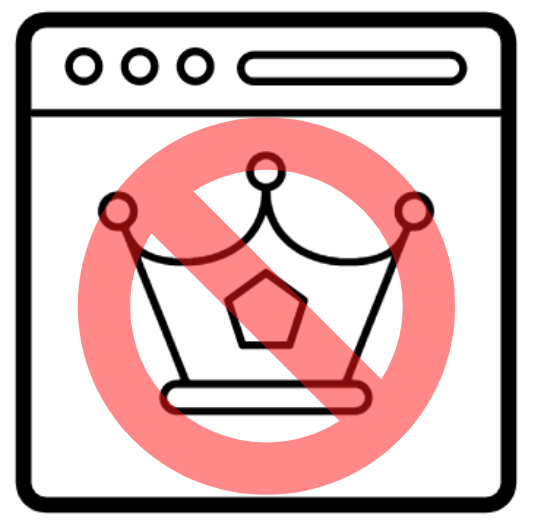
“Content is king” might be the most overused and cliche phrase in SEO.
Thankfully, most people in the industry have scrubbed it from their vocabularies.
But you don’t have to look hard to see that the concept is alive and well. That is, you can somehow game Google by pumping out a bunch of “quality content” and calling it a day.
The problem? The notion that “content is king” is vague advice that’s misleading at best.
https://twitter.com/samueljscott/status/1238042929349918721
Listen: it’s not 2007 anymore. It’s high time to put the phrase to bed.
Or at the very least, it’s time to take a deep dive into why the “content is king” cliche is so misleading. In this post, we’ll do exactly that.
Who said “content is king,” anyway?
Prior to becoming a buzzphrase in SEO for the better part of a decade, the phrase can be traced back to a 1996 essay from Bill Gates published on Microsoft’s website (aptly titled “Content is King”).
The essay definitely reads like something straight out of 1996, heralding the mysterious enigma of “the Internet” as the future of all content consumption.
Entertainment, information and advertising. All of it. Honestly, the essay has the same vibes of this gem:
Of course, Gates doesn’t explicitly talk about SEO. The essay was published two years prior to the founding of Google, after all.
The essay does briefly touch on advertising, though. To his credit, Gates correctly predicts the widespread availability of free or near-free information serving as an alternative to old-school, paid media.
Okay, but who said “content is king” in SEO?
It’s difficult to pinpoint who first brought the phrase into the lexicon of search marketing. That said, blog posts decreeing “content is king” were all the rage on sites like Search Engine Watch in 2007.
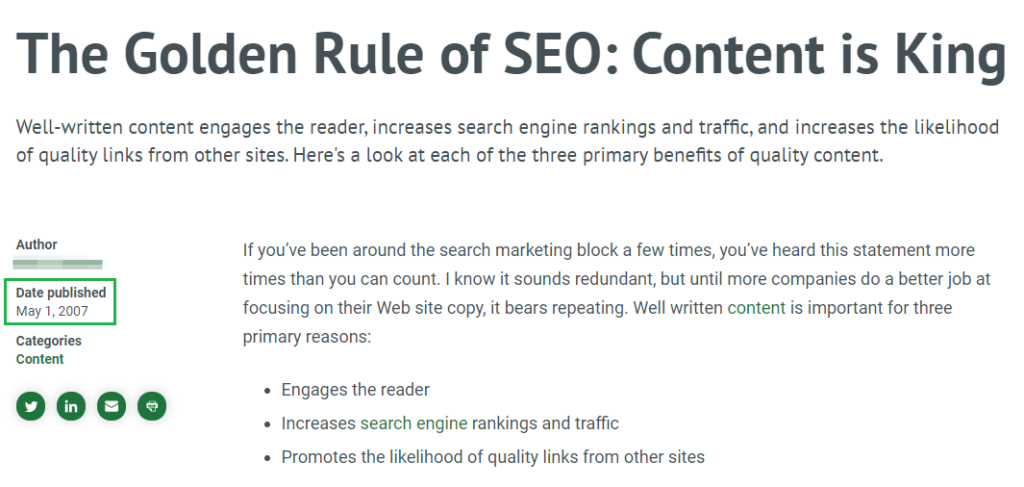
Perhaps the phrase gained a bit more credibility when folks from Google got on board with it. Here’s a 2008 video of Matt Cutts (former head of Google’s web spam team) briefly discussing the “content is king” concept as a positive:
The origins of the phrase are fuzzy, but we can still speculate as to why “content is king” in SEO became such conventional wisdom.
Looking back now, the advice to focus on high-quality, original content written seems elementary, right? But bear that mid-2000s was an era dominated by some seriously spammy SEO tactics.
Besides, “content is king” is catchy. It rolls off the tongue. It’s an incredibly simple concept to understand and sell to marketers.
Because hey, the idea that you just had to create “great content” to rank was definitely more satisfying than obsessing over the technical aspects of SEO. This also made Google seem like a proverbial good guy, rewarding those who played by the rules.
And so the phrase spread like wildfire, as evidenced by the 90+ posts on Search Engine Land featuring “content is king.” Within a few years, however, the concept come under scrutiny. For reference, check out the dates and and sentiments of the posts below:
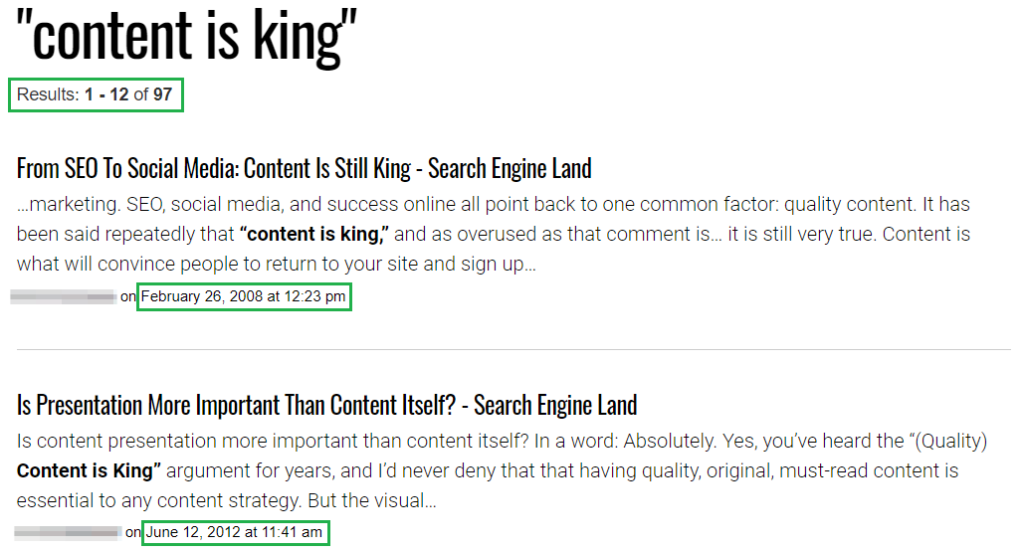
The problem(s) with “content is king” in SEO
Now, let’s dig into why the phrase is fluff when it comes to SEO.
For starters, what does “content is king” mean?
Again, it’s vague advice. Going back to the definition laid out in the Bill Gates essay, pretty much anything and every everything can be defined as “content.” Are we talking about blog posts? Videos? Both?
Let’s assume we’re talking about blog writing. Without any sort of additional context, the idea of that “content” is king seems to imply the following:
- Publishers should strive to create as much content as possible
- Creating original, in-depth content guarantees higher search rankings
- “Good” content attracts attention and links by virtue of being, well, good
Of course, all of these assumptions are flawed.
Why? Well, nobody should publish content “just because.” Given the legwork (and budget) required to write a worthwhile blog post, doing so is a massive waste.
Also note that even “good,” well-optimized content isn’t guaranteed rankings. Not by a long shot.
Here’s an example as highlighted by Ryan Robinson of RyRob.com. Robinson notes that five posts account for 63% of his site’s traffic, seemingly confirming that a brute force content attack necessarily doesn’t go hand in hand with rewards from Google.
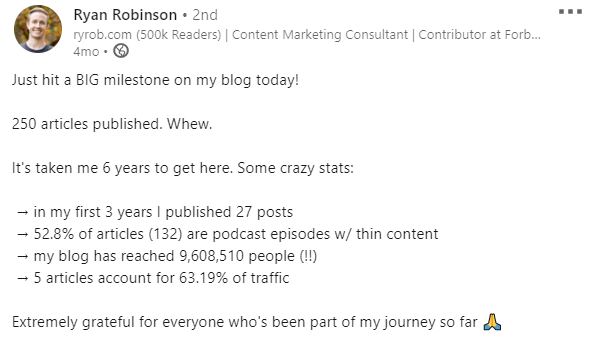
And besides, just because you’re getting traffic doesn’t mean that it’s meaningful traffic.
As noted by Animalz, content marketing outliers that drive disproportionate traffic for keywords unrelated to your site can send negative signals to Google.
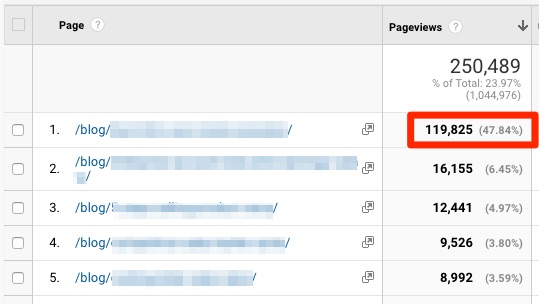
Oh, and don’t forget that a staggering 91% of content gets no organic traffic. That includes “high quality” content that’s just sitting undetected by SERPs.
What else does “content is king” ignore in SEO?
Good question! Let’s break down point-by-point what else the “content is king” manages to ignore.
Content distribution
This is a big one.
The cliche of “content is king, distribution is king” is eye-roll worthy, but the notion isn’t totally wrong.
There are tons of valuable distribution channels available to bloggers today, including:
- Social media (see the Squarespace example below)
- Repurposing your blog post into an image or infographic
- Converting your content into a long-form or short-form video
- Publishing to third-party content platforms (Medium, Growthhackers, LinkedIn)
- Reworking your blog post into a message for your email subscribers
Your hard work deserves to be showcased beautifully. The Making It blog walks you through how to do just that by creating an online portfolio: https://t.co/HD5lud5B67 pic.twitter.com/r8iVK2UUtw
— Squarespace (@squarespace) April 14, 2020
That is, distribution plays a massive role in your content’s shareability, likelihood to gather backlinks long-term.
For example, let’s say you have a massive social following or email list. The ability to blast your content to hundreds or thousands of people on a whim definitely gives you a leg-up when it comes to link-building and driving immediate traffic to your site.
Now, I’m not knocking marketers and “gurus” for building their audiences. But note that what works for someone with a massive, established following isn’t necessarily going to work for an up-and-comer with little to no audience or existing traffic steams.
On-page optimization
Sure, there are some posts that are able to rank “on their own” without much in terms of optimization.
And yes, the pursuit of perfect SEO content is a rabbit hole that’s often fruitless.
But on the flip side, natural keyword mentions and exact matches in your titles or H2s can make a massive difference versus not optimizing your content at all.
Remember that there are likewise hundreds of factors that influence how well a post ranks in Google. “Content is king” manages to ignore most of them.
Here are 100+ Google SEO success factors that actually improve your ranking, grouped by:
— Gill Andrews (@StoriesWithGill) April 14, 2020
* What to focus on
* What to ignore
* What to avoid
👉 https://t.co/FrDd0EYGFC h/t @CyrusShepard #seo #contentmarketing
For example, consider that backlinks are so well-documented as one of Google’s key ranking factors. Backlinks are absolutely necessary to most high-competition keywords and therefore go far beyond the task of simply writing “great content.”
Readability and shareability
There’s an old-school study which notes that 50% of content gets 8 shares or less.
It’s no secret that most content (and especially most SEO content) kind of sucks. Making your content worth reading in terms of style and voice are both critical to scoring backlinks and shares. Just because a piece of content is technically sound or optimized doesn’t make it “great.”
We can look at posts from the MailChimp blog as a shining example of what readable, share-worthy content looks like. Actionable and conversational while still ticking the boxes of optimization, this is the kind of stuff that people actually read.
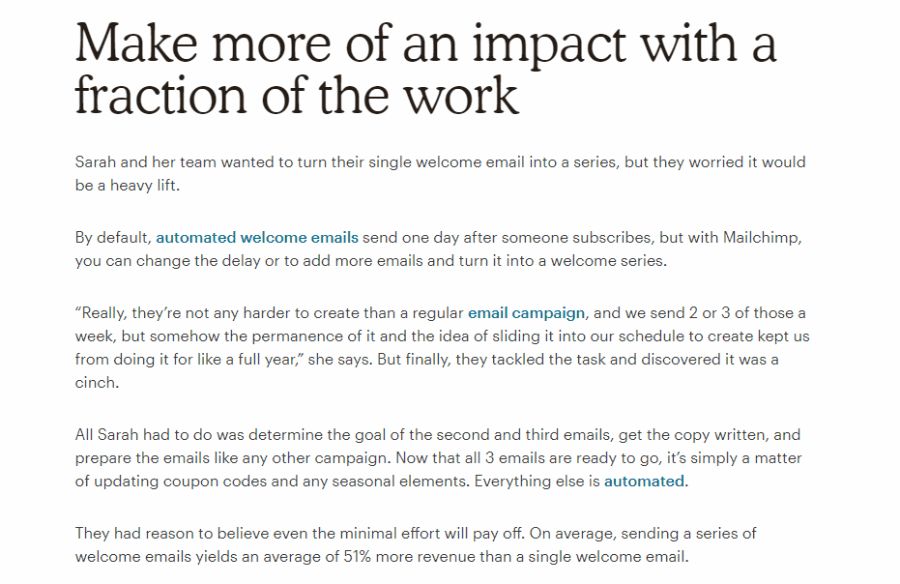
Depth and expertise
Content that dominates the SERPs is oftentimes written by either skilled writers, subject matters experts or both.
Anyone can write a blog post. However, not everyone is capable or writing an in-depth post that people can actually take something away from.
The simplified concept of “content is king” assumes that writing an actionable, data-driven blog poist is such an easy task. In reality, it’s anything but.
Consider sites like Sumo with their massive, in-depth guides written by marketing experts who actually know what they’re talking about. Their content ranks well and gets shared like crazy as a result.

If you’re incapable of producing the content you need to be considered “king,” you obviously have a problem. That’s the case for most people who either aren’t writers, don’t have the budget to hire writers or aren’t subject matter experts in whatever they’re writing about.
Content goals
What’s the point of your content? Subscribers? Pure traffic? Sales?
If there’s not a purpose behind your overall strategy, why invest in content in the first place?
Dreams don’t come true because you’re driving traffic to your site. Rather than assume “if you build it, they will come,” it’s crucial to understand what you’re building and why people are landing on your posts.
Content creation and SEO require you to know your goals and likewise dig into your data. I beg you: don’t make the blogging mistake of “spraying and praying.”

Can we stop saying “content is king” now?
We can all agree that nobody should invest in subpar SEO writing.
And we can likewise all agree that there’s a lot of beatable blog content out there.
However, we can’t just say “content is king” and call it a day.
Doing so is far from the be-all, end-all of SEO. Repeating the phrase in 2020 and beyond is honestly disingenuous, too.
But hey, hopefully I’m not ruffling too many feathers here. I’d love to know what you think about “content is king” and conventional wisdom when it comes to SEO writing. Feel free to hit me up on Twitter or comment below.
This post was last updated on 4/19/2020.
Leave a Reply